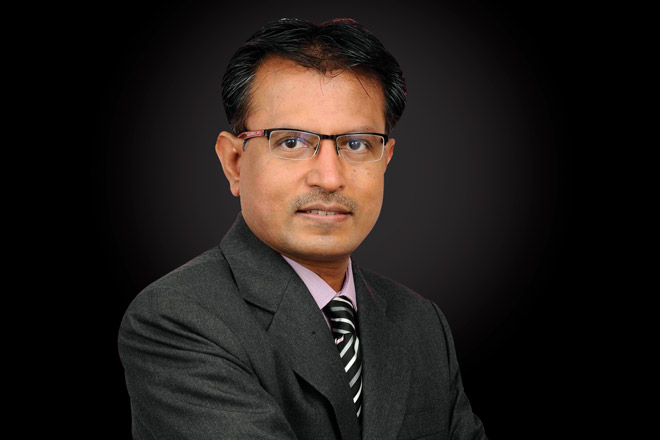FundsIndia had caught up with Mr.Nilesh Shah, the Managing Director of Kotak Mahindra Asset Management Co Ltd. He has over 25 years of experience in capital markets and investments, having managed funds across equity, fixed income securities and real estate for local and global investors. This meeting was to educate ourselves and our customers on the mantra behind Nilesh Shah’s soaring success.

Find excerpts from the interview below:
Q: Tell us about your investment journey. When did you first start investing what encouraged you to do so?
A: I started investing when I was just out of school. Those were the days when IPO markets were guaranteed success. I started investing in IPOs of various companies. Obviously, I was a novice then. While I made money in the short term, I lost money over the long term. A big break came in 1991, during the Harshad Mehta days. The stock prices were skyrocketing. I had invested some amount of money, which I lost after the bubble burst. Clearly, after I lost money, I got the wisdom that stock markets are not for novices. It requires a professional approach. Fortunately, I got a job in the ICICI Mutual Banking division, which gave me contact with promoters and others who helped me continue my journey in investments.
Q: How have you evolved as an investor and what’s your broad investment philosophy? List a few vital lessons you learnt along the way. Have you also faced any setbacks while investing? If so, how did you overcome them?
A: Obviously, over 30 years, I would have made many mistakes. In the initial days, I kept repeating my mistakes. Later, I realised that it is better not to repeat mistakes. Nowadays, I manage money for retail investors and wholesale investors. They give me money with the hope that I won’t make the mistakes that they are capable of making. Otherwise, they wouldn’t need me. So, I need to ensure that I don’t make such mistakes. In 2000, where we lost money in many companies in which business modules were not even established, it was the first realization that when you invest, the business should be real. 2008 taught us that valuation is important.
Over the years, if I have to define today’s investment philosophy, it is very simple. Buy good companies run by good managers available at good prices. It’s very easy to say this but very difficult to execute. But the three points mentioned above are the things I want to focus on. A company that makes more money than its cost of capital is a good company. If a company can’t recover its cost of capital, there’s no point in investing in it. A good manager is one who has the ability to set a good vision for the company and back it up with proper execution. More importantly, they must have minority shareholders’ interests protected. Good price is where you believe that your estimate of growth will be higher than what is priced by the market. This is a simple philosophy that has been working well for us.
Q: Would you call yourself a workaholic or are you able to maintain the work-life balance?
A: I would like to call myself someone who balanc¤es between work and life. But my family says that work is my life. If you are passionate about something, you will enjoy doing it. I am competing with some of the smartest and most hard-working minds in the market. If they put in 1000 hours of work, I have to put in 1001 hours. They are as smart as I am. So, in order to succeed and outperform them, I must work harder.
Q: What’s your stress buster of choice?
A: I burst stress with my work. My work is my stress buster. When I started my career in 1991, I was jumping out of bed to go to Office. Even in 2019, I get the same feeling to rush to work.
Over the years, I have seen innumerable blessings come to me. Once, I went to get my car from the repair shop. Unfortunately, the credit card machine was not working. The owner demanded cash and I was not carrying cash then. I conveyed that I will either go home or collect cash from an ATM. When I went to collect cash and came back, the owner informed that my bill was paid. When I asked as to who paid for it, a person standing behind me, who overheard the conversation, had done it. I had to rush to find the person and take his number to make the final payment. When a stranger is willing to pay an amount for you because of your work, it is the passion and love that matters. There are many other incidents, which make me feel blessed because of the work I do.
Q: How should an investor’s 5-year/10-year investment blueprint look like, broadly? How does one go about setting realistic goals and stay on track to achieve them?
A: As investors, we have our greed and fear. Invariably, I have seen people getting a lot by greed in good days and getting down by fear in bad days. Effectively, I will recommend any investor to consult a good advisor any day. An advisor will charge you, of course. But they will be a shoulder or an anchor to balance greed and fear. When people are earning, they don’t invest objectively. This is where it becomes difficult to generate appropriate returns on investment.
To have a financial advisor, to have an understanding of what your goals are, to create a plan which takes care into account your risk profile, are absolutely important. This is just the first step to ensure that every year you are on course. My recommendation to investors would be, find a good financial advisor like a professional doctor, open yourself to them, get a good plan setting your risk profile and investment objective, follow the plan, and keep revising the goals or modifying the plan as the journey progresses.
Q: Shed light on some widely-believed myths about investments and the markets that you would like to bust? What are some common mistakes that you observe investors making?
A: First myth is, our culture tells us that money is not everything in life.
Sometimes, people think that experts have Midas Touch. But if we had a Midas touch, there was no need for us to work. I make money through a disciplined plan, not through my ability to predict the future. So, we must never take shortcuts.
Investment and trading are different. When you lose money in trading, it is not an investment. Trading is done through stop loss, while investments are done through averaging. People get confused between the two and end up suffering. Also, when people reach out to a professional, they expect positive results. This is not possible as markets are volatile. So, one must give sufficient time to an advisor and not have unrealistic expectations. Rome was not built in a day. Similarly, equity returns can’t be made in a short period. People often don’t invest as they consider it complex. But, investments are very simple and commonsensical. If you are a regular, disciplined, long-term investor, you will be able to achieve your investment objective without any trouble.
Q: What would you say about the current market scenario? Is it different from prior slowdowns or would you call it cyclical? How long do you think it might take for markets to get back on track?
A: Market is driven by three things: flow, sentiments, and fundamentals.
- Flow is required for the market to go up. Nowadays, only domestic institutional investors are buyers. All others are sellers. During Retail & HNI selling, the flow of domestic institutional investors are not supported.
- The sentiments of the buyers and the sellers are subdued. It will take time and more than what is already done for the sentiments of investors to be revived. This can be done by the withdrawal of LTCG and easy KYC process. Providing SPI investors with a license to invest anywhere in India will definitely revive investors’ sentiments. From both the flow and sentiment point of view, we are neutral to the negative territory.
- If fundamentals improve, flows and sentiments will improve automatically. There are two kinds of fundamentals: valuation and future expectations. The largecaps, which comprise of 15 to 20 stocks, are way above the historical average and very expensive. But there are many other large, mid, and smallcaps that is below the historical average. So, it is noticed that the comfort lies in the mid and smallcaps. If we look from a future point of view, the 5% GDP growth for the first quarter has subdued our fundamentals. The data for August 2019 does not give confidence that the September 2019 GDP quarter will be any different. The market is worried about the situation in real estate, NDFC, and many other industries. Clearly, the market will be looking for revival and growth, for which the government and RBI are working hard. Nowadays, the market is demanding more. At some point in time, markets will be convinced with the response of the government in terms of changing the growth trajectory.
Q: What are your thoughts on the active vs passive funds debate?
A: There are many advisors globally who are talking about this. There’s a very famous fund manager Michael Burry based on whom a movie called “The Big Short” was made. Last week, he highlighted that in 2000, there were more than 1000 stocks with less than 1 million dollars turnover every day. Passive funds have built billions of dollars in possession. What will happen to prices if they get liquidated tomorrow? This is the problem with global passive fund investors.
In the global context, the majority of active fund managers are underperforming their passive indices. In the Indian markets, earlier we did not have to worry about indexes outperforming the active funds. As our size increased, markets became more efficient. Our performance with the benchmark index started narrowing. We evaluate our performance with the benchmark index. The total return index with which we are comparing our benchmark or fund performance does not have any cash. We provide redemption on a daily basis by maintaining 5-7% cash.
Globally, when fund managers’ performance is compared, the expense ratio is added back. Their indices have impact cost mechanism. In this situation, we must live with whatever constraint has been imposed on us. Despite that, most of our funds have been outperforming the benchmark index. So, if we can add value to the investors’ portfolio, why can’t it be done? Keep in mind the burden placed on Fund Managers, when their performance is compared with the total return index, the difference due to cash and impact cost.
Click here to listen to Mr.Nilesh Shah’s ConCall with FundsIndia Investors!







